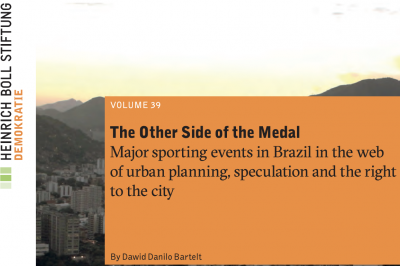The Other Side of the Medal
15 Aug 2015
Author - Boell Foundation

Let's not mince words: the lofty promises of how the 2014 Men's World Cup would improve the lives of Brazil's people were empty. On the contrary – not only was the most expensive World Cup of all time a bitter letdown for the country's sports fans, the economic and social costs will weigh heavily on Brazil for a long time to come.
The tournament cost at least €8.5 billion – more than twice as much as the World Cup in South Africa in 2010. Around 85 percent of that amount was not financed privately as promised, but consisted of public money and loans. The expenditure did not generate economic growth momentum, however. Brazil's economic growth for the whole of 2014 is estimated to be well below one percent – and how much of that can be traced back to the World Cup remains unclear.
The social costs, by contrast, were high. Various estimates put the number of people displaced or threatened with eviction at up to a quarter of a million. The human right to adequate housing was systematically violated. The promised development of public transportation infrastructure largely proved to be a chimera. The funds mainly went toward the expansion and conversion of airports and access routes, offering no benefit to the majority of Brazilians. The major protests in 2013 showed what they really need: schools, clinics, functional and reliable public transportation, ideally up to «FIFA standards», as could be read on the protesters' placards. And now? By hosting the 2016 Summer Olympics, Brazil has a new opportunity to learn from its mistakes and show that sporting mega-events can benefit the general public. Once again, the promises are tantalizing: a new tram in the port zone, bus rapid transit routes, new and longer metro lines and sewage treatment for the entire city. Rio's waters are to become cleaner: in its bid for the games, the city promised to cut pollution in Guanabara Bay by at least 80 percent. The private sector is slated to cover a significant share of the financing.
Read the full report: The Other Side of the Medal



